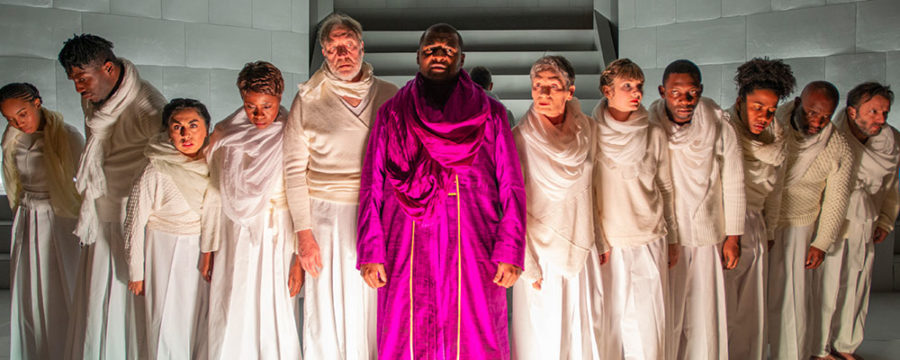Even if you have neither read nor seen Oedipus Rex, it’s likely you know its big twist: Oedipus kills his father and marries his mother. It’s a shocking twist, and it exemplifies the genre of ancient Greek tragedies so well that it has lived in the public conscience for over 2,000 years.
If a story is so notorious that more people know its twist than have actually seen the show, how can productions of the original play persuade someone to even want to see it? The Court Theatre has a solution: simply accept it and put on a good show.
Oedipus Rex, which opened on November 17, marks the start of the Court Theatre’s Oedipus Trilogy: The Theatre will stage all three of Sophocles’s Theban plays over the course of the next year. The aim is to track Oedipus’s journey from the throne to exile, and the lasting impact his actions have on his family and country. Following Oedipus Rex will be The Gospel at Colonus, an adaptation of Sophocles’s Oedipus at Colonus through the lens of an African American gospel choir. Antigone will conclude the trilogy in October of next year. This production of Oedipus Rex is best understood in that context—without giving too much away, there is a teaser for The Gospel at Colonus toward the end of the production that might prove jarring if you are expecting a straightforward production of Sophocles’ text.
Using a translation by Nicholas Rudall, the late UChicago professor and former artistic director at the Court, the Court’s production of Oedipus Rex is equal parts engaging and suspenseful. Charles Newell’s direction and the actors’ strong performances are wonderfully enhanced by the production’s design elements. John Culbert’s stark scenic design suggests a stage not far removed from what one might have seen in a Greek amphitheater, yet somehow retains a sense of modernity. Keith Parham’s lighting and Andre Pluess’s sound design immerses the audience in Oedipus’s world, engaging the audience with the play’s suspense even though everyone already knows its ending.
Where this production falters somewhat in my eyes is in its use of abstract imagery. Transitions for this production make extensive use of abstract choreography to depict the plight of the people of Thebes. This is best used in the opening sequence, where the plague is symbolized by the Chorus literally crawling and gagging onto the stage. Later sequences came off as less polished, and I ultimately failed to understand their purpose in the context of the whole show.
Nevertheless, the Court’s Oedipus Rex is worth seeing purely for the cast’s performances. As the title character, Kelvin Roston, Jr. commands the stage as he takes the audience on Oedipus’s tragic journey. Kate Collins brings a hard edge to Jocasta as she realizes long before Oedipus the unspoken truth of their relationship and desperately tries to tear him from his destructive path, to no avail. Particular praise has to be given to Christopher Donahue as Teiresias, the blind prophet who warns Oedipus of his doom. Teiresias’s sequence of warnings was equal parts unnerving and hilarious as Donahue played up the scene’s key dramatic irony.
Indeed, part of the joy in viewing this production is knowing exactly how the story goes, yet still being drawn in as the tension rises towards the play’s climax: the gouging out of Oedipus’s eyes once he learns the horrifying truth of his relationship with his mother. The Court’s Oedipus Rex offers a night of thrilling Greek tragedy, and a teaser of things to come for the theater.









